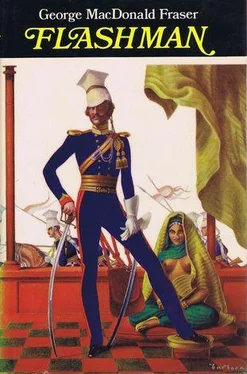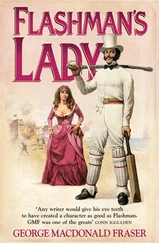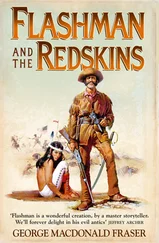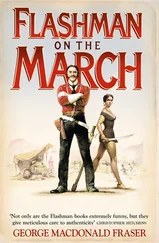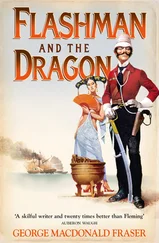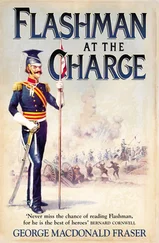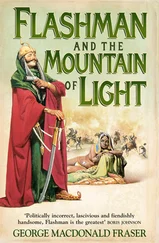"It’s not fair!" I shouted.
"Not fair! Well, well, this is one lesson you’re learning. Nothing’s fair, you young fool. And don’t blubber about not wanting to go and leave her - she’ll be safe enough here."
"With you and Judy, I suppose?"
"With me and Judy," says he, very softly. "And I’m not sure that the company of a rake and a harlot won’t be better for her than yours."
That was how I came to leave for India; how the foundation was laid of a splendid military career. I felt myself damnably ill-used, and if I had had the courage I would have told my father to go to the devil. But he had me, and he knew it. Even if it hadn’t been for the money part of it, I couldn’t have stood up to him, as I hadn’t been able to stand up to Cardigan. I hated them both, then. I came to think better of Cardigan, later, for in his arrogant, pig-headed, snobbish way he was trying to be decent to me, but my father I never forgave. He was playing the swine, and he knew it, and found it amusing at my expense. But what really poisoned me against him was that he didn’t believe I cared a button for Elspeth.
There may be better countries for a soldier to serve in than India, but I haven’t seen them. You may hear the greenhorns talk about heat and flies and filth and the natives and the diseases; the first three you must get accustomed to, the fifth you must avoid - which you can do, with a little common sense - and as for the natives, well, where else will you get such a docile humble set of slaves? I liked them better than the Scots, anyhow; their language was easier to understand.
And if these things were meant to be drawbacks, there was the other side. In India there was power - the power of the white man over the black - and power is a fine thing to have. Then there was ease, and time for any amount of sport, and good company, and none of the restrictions of home. You could live as you pleased, and lord it among the niggers, and if you were well-off and properly connected, as I was, there was the social life among the best folk who clustered round the Governor-General. And there were as many women as you could wish for.
There was money to be had, too, if you were lucky in your campaigns and knew how to look for it. In my whole service I never made half as much in pay as I got from India in loot - but that is another story.
I knew nothing of this when we dropped anchor in the Highly, off Calcutta, and I looked at the red river banks and sweated in the boiling sun, and smelt the stink, and wished I was in hell rather than here. It had been a damnable four-months voyage on board the crowded and sweltering Indiaman, with no amusement of any kind, and I was prepared to find India no better.
I was to join one of the Company’s native lancer regiments [9] Military service with the East India Company’s regiments was considered socially inferior to service in the army proper, and Flashman must have been conscious of this, which possibly accounts for his casual reference to it. The Company at this time drew its artillery, engineer, and infantry officers from the Addiscombe training establishment; cavalry officers, however, could be appointed direct by the Company’s Directors. Cardigan, who seems to have had a liking for Flashman (his judgement of men, when he condescended to use it, was deplorable) may well have had influence with the Board.
in the Benares District, but I never did. Army inefficiency kept me kicking my heels in Calcutta for several weeks before the appropriate orders came through, and by that time I had taken fortune by the foreskin, in my own way.
In the first place, I messed at the Fort with the artillery officers in the native service, who were a poor lot, and whose messing would have sickened a pig. The food was bad to begin with, and by the time the black cooks had finished with it you would hardly have fed it to a jackal.
I said so at our first dinner, and provoked a storm among these gentlemen, who considered me a Johnny Newcomer.
"Not good enough for the plungers, eh?" says one. "Sorry we have no foiegras for your lordship, and we must apologise for the absence of silver plate." "Is it always like this?" I asked. "What is it?" "What is the dish, your grace?" asked the wit. "Why, it’s called curry, don’t you know? Kills the taste of old meat."
"If that’s all it kills, I’m surprised," says I, disgusted. "No decent human being could stomach this filth."
"We stomach it," said another. "Ain’t we human beings?"
"You know best about that," I said. "If you take my advice you’ll hang your cook." And with that I stalked out, leaving them growling after me. Yet their mess, I discovered, was no worse than any other in India, and better than some. The men’s messes were indescribable, and I wondered how they survived such dreadful food in such a climate. The answer was, of course, that many of them didn’t.
However, it was obvious to me that I would be better shifting for myself, so I called up Basset, whom I had brought with me from England - the little bastard had blubbered at the thought of losing me when I left the 11th, God knows why - gave him a fistful of money, and told him to find a cook, a butler, a groom, and half a dozen other servants. These people were to be hired for virtually nothing. Then I went myself to the guard room, found a native who could speak English passably well, and went out to find a house. [10] The Company did not believe in maintaining houses for transients and visitors; they were expected to find hospitality with British residents or pay their own lodgings.
I found one not far from the Fort, a pleasant place with a little garden of shrubs, and a verandah with screens, and my nigger fetched the owner, who was a great fat rogue with a red turban; we haggled in the middle of a crowd of jabbering blacks, and I gave him half what he asked for and settled into the place with my establishment.
First of all I sent for the cook, and told him through my nigger: "You will cook, and cook cleanly. You’ll wash your hands, d’ye see, and buy nothing .but the finest meat and vegetables. If you don’t, I’ll have the cat taken to you until there isn’t a strip of hide left on your back."
He jabbered away, nodding and grinning and bowing, so I took him by the neck and threw him down and lashed him with my riding whip until he rolled off the verandah, screaming.
"Tell him he’ll get that night and morning if his food’s not fit to eat," I told my nigger. "And the rest of them may take notice."
They all howled with fear, but they paid heed, the cook most of all. I took the opportunity to flog one of them every day, for their good and my own amusement, and to these precautions I attribute the fact that in all my service in India I was hardly ever laid low with anything worse than fever, and that you can’t avoid. The cook was a good cook, as it turned out, and Basset kept the others at it with his tongue and his boot, so we did very well.
My nigger, whose name was Timbu-something-or-other, was of great use at first, since he spoke English, but after a few weeks I got rid of him. I’ve said that I have a gift of language, but it was only when I came to India that I realised this. My Latin and Greek had been weak at school, for I paid little attention to them, but a tongue that you hear spoken about you is a different thing. Each language has a rhythm for me, and my ear catches and holds the sounds; I seem to know what a man is saying even when I don’t understand the words, and my tongue slips easily into any new accent. In any event, after a fortnight listening to Timbu and asked him questions, I was speaking Hindustani well enough to be understood, and I paid him off. For one thing, I had found a more interesting teacher.
Her name was Fetnab, and I bought her (not officially, of course, although it amounted to the same thing) from a merchant whose livestock consisted of wenches for the British officers and civilian residents in Calcutta. She cost me 500 rupees, which was about 50 guineas, and she was a thief s bargain. I suppose she was about sixteen, with a handsome enough face and a gold stud fixed in her nostril, and great slanting brown eyes. Like most other Indian dancing girls, she was shaped like an hour-glass, with a waist that I could span with my two hands, fat breasts like melons, and a wobbling backside.
Читать дальше
Конец ознакомительного отрывка
Купить книгу
